 |
 |
 |
 |
 |
 |
 |
 |
 |
FA Cup fourth round replay - Elland Road - 45,821
Scorers: Clarke 2
Leeds United: Sprake, Reaney (Jordan), Cooper, Bremner, Charlton, Hunter, Lorimer, Clarke, Madeley, Giles, Gray
Liverpool: Clemence, Lawler, Lindsay, Smith, Lloyd, Hughes, Keegan, Ross, Heighway (Boersma), Graham, Callaghan
Events outside football meant that the replay would
be scheduled to commence in the afternoon of Wednesday, 9 February,
rather than 7.30 in the evening as was customary for midweek games. United secretary Keith Archer explained: 'The electricity
board cannot guarantee us lighting for a night match, so on safety grounds
alone we have no alternative but to make it a 2.30pm start. An evening
match would have been a gamble.' The problem arose because of a bitter dispute between
the National Coal Board and the National Union of Mineworkers. On the day of the replay, The Times reported that
a state of emergency would be declared to 'ensure the maintenance of essential
supplies and services for the duration of the miners' strike. 'The decision to issue a royal proclamation and take sweeping
emergency powers was reached at a meeting of the Cabinet emergency committee
yesterday morning. The Prime Minister is understood to have informed the
Queen of the Government's intention when he had an audience at Buckingham
Palace. 'It had been clear since the Cabinet emergency committee
met last Thursday that a move towards the proclamation of an emergency
would be made this week. The Government did not want to seem to be acting
provocatively, but there were warnings that had to be heeded from the
power industries that their stocks of coal were falling. 'For the present, the Government will be content to control
floodlighting and display lighting and other uses of power not regarded
as essential.' Two days later a committee of inquiry was established
under Lord Wilberforce to investigate the miners' Three months of negotiations with the NCB had ended
in deadlock at the beginning of January and miners had walked
out on 9 January in their first national dispute for 50 years,
demanding a £9 a week pay rise on top of an average wage of £25.
The government offered a 7.9% deal - just below its unofficial
8% pay ceiling - but the NUM refused to put it to the vote. The
NCB withdrew the offer on 8 January. The Central Electricity Generating Board announced
that many homes and businesses would be without electricity for
up to nine hours a day. It was reported that with immediate effect,
electricity would be switched off on a rota basis between 7am
and midnight every day, meaning that consumers would face longer
power cuts, up from six to nine hours. The shortage of electricity
was forcing more and more factories and businesses to close. Two days later, the three-day working week was introduced
to conserve electricity supplies and it was claimed that 1.2m
workers had been laid off. On 19 February, after much negotiation,
an agreement was reached between the National Executive Committee
of the NUM and the Government. Picketing was called off, and on
25 February, the miners accepted the offer in a ballot, returning
to work on 28 February. There was no certainty that electricity would be
available to run the floodlights that an evening kick off would
have demanded; United decided that they had no alternative other
than an afternoon start for the game with Liverpool. One local school, Parkside Boys Secondary, where
Paul Madeley had been educated, gave its pupils a half day's holiday
because of the risk of truancy. Despite the early kick off, on the day following
the Anfield draw, Liverpool fans queued round the block for the
10,000 tickets allocated to away supporters. There were almost
46,000 supporters packed into Elland Road for the game, with hundreds
locked out and many up on the roof of the nearby Old Peacock pub
straining to view the action. Jack Charlton
was fit to return at centre-half after flu and Madeley wore the
No 9 shirt in place of Mick Jones, who was laid low by the virus.
Eddie Gray, recovered from an ankle injury, replaced Mick Bates
on the left flank and young striker Joe Jordan was named as sub.
Despite being nominally centre-forward, Madeley operated in midfield,
with Billy Bremner playing in an advanced role. For Liverpool, Bobby Graham came in for John Toshack
and Phil Boersma took Graham's place on the bench. Liverpool showed from the off that they meant business
and were fully prepared to cause United some difficulties. Allan
Clarke required treatment in the second minute after being brought
down by Emlyn Hughes; seconds after the resumption, Gray was felled
by a clumsy challenge. Leeds were first to show a threat, however, and
Terry Cooper prompted hopes of a goal when he skipped effortlessly
past three defenders in a threatening run, but his angled shot
from 20 yards flashed narrowly wide. Liverpool broke back in the thirteenth minute when
Ian Callaghan found Steve Heighway in the middle. The United defence
shepherded him sideways, however, and when he fed Hughes, the
shot from 25 yards went blazing high over Gary Sprake's bar. Chances were few and far between, but United seized the
initiative mid way through the half with an outstanding goal. Cooper began
the move, which was taken up by Johnny Giles and Madeley. Norman Fox in
The Times: 'Bremner's excursions in the front line always worried
Liverpool. His perfected changes of direction can never be anticipated
and here, after 22 minutes, Clarke: 'I cannot remember much about the build up to the
first. I saw the ball come over from Billy Bremner and I ran on, let it
bounce and then tapped it over Ray Clemence. We had a talk about Liverpool
before the match and one of the things which cropped up was that Clemence
appeared to have this habit of coming off his line. So when I saw him
running towards me I simply lifted it over him.' Leeds continued to dominate the first half, though
Liverpool came close to an equaliser minutes before the break.
They were awarded a free kick when Giles handled, and Larry Lloyd
met the free kick from Hughes to nod against an upright. In the
ensuing scramble Paul Reaney had to clear from the feet of Heighway
before Tommy Smith crashed a shot from 25 yards over the bar. Bill Shankly obviously spent his half time wisely
and Liverpool came out strongly to force the home side onto the
defensive. Boersma had been brought on for the struggling Heighway,
who had clearly lost his confidence. Gary Sprake was forced to
save in fine fashion from Callaghan's rising shot in the first
few minutes. United did manage to show they were still a threat:
Hughes was booked after 49 minutes when he sent Cooper crashing
to the ground and when the left-back's centre found Peter Lorimer,
the Scot sent a fierce shot narrowly wide of the far post. If the visitors Having calmly weathered the Liverpool storm, United doubled
their advantage in the 63rd minute with a wonderful goal. Norman Fox:
'Clarke's second and decisive goal was so much the product of individuality
that it would have seemed impossible on the evidence of Saturday's taciturn
teamwork. It was founded on a shrewd pass from Giles, out to the touchline
near the halfway flag, where Clarke began his run. Lloyd converged and
Clarke avoided him as if skipping over an irksome hurdle. Clemence came
out; Clarke moved on. A sudden slight turn and Clarke had left Clemence
on the ground and the ball was flying low through an absurdly small gap
and into goal by the near post.' Referee Gordon Hill described it extravagantly as the greatest
goal in the history of football. Clarke said after the game,'When I got
round Larry Lloyd, I saw Clemence advancing so I let him come on. It was
impossible for me to bend it round him because I was at a bad angle. He
left about two feet between himself and the near post, so I aimed for
it and in it went. Sometimes they do and sometimes they don't.' Clarke did not count it as his best goal. 'That came, strangely
enough, against Liverpool at Anfield when I was a Fulham player. I put
the ball in the middle of the field and beat three or four men before
sticking it in the net … Bill Shankly, I think, described it as the best
goal he had seen scored at Anfield.' Goalkeeper Sprake preserved United's advantage when
he launched himself across goal to push away a header from Bobby
Graham. It was one of a number of impressive saves made by the
Welsh keeper as he snuffed out the dying Liverpool threat. United
were good At the close, Eric Todd acknowledged the contribution of
Clarke, and not just for his goals. 'I for one must, on this performance,
revise my opinion of Clarke, whose undoubted talents are not usually revealed
within his own penalty area. But here he was helping out in defence, spraying
passes which Bremner and Giles would have envied, and scoring both goals
into the bargain. Giles was his old self again, and with Cooper and Hunter
quite unbeatable, Leeds looked what the world knows them to be - a solid,
dedicated team, blessed with a mutual understanding given to very few.' Allan Clarke: 'This was my answer to the critics who say
I do not work hard enough. The boss has been on to me to get more involved
and I enjoyed it this way.' Gordon Hill applauded the teams off at the end, saying,
'I have never done anything like that before but it was my way of saying
thank you to both teams for two tremendous games. I enjoyed being the
referee. The second half will go down in soccer history.' Don Revie: 'It was
a great game but I don't think you can ever relax against a side like
Liverpool. They are still one of the hardest sides in the world to beat.' It was typical of Bill Shankly, however, to comment, 'Not
been much in it apart from two clever goals.'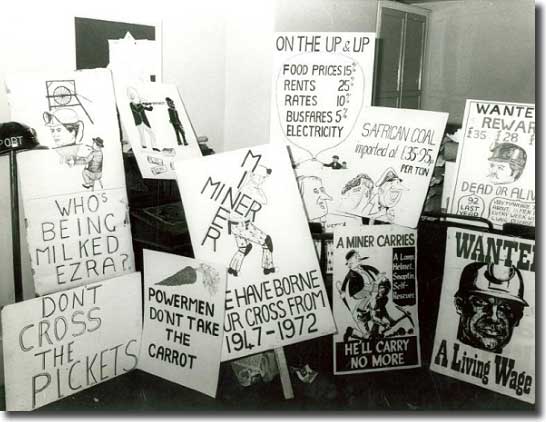 On 5 February 1972, Leeds fought out a goalless draw with Liverpool
at Anfield in the FA Cup fourth round, allowing them to take the Merseysiders
back to Elland Road for a replay during the week that followed.
On 5 February 1972, Leeds fought out a goalless draw with Liverpool
at Anfield in the FA Cup fourth round, allowing them to take the Merseysiders
back to Elland Road for a replay during the week that followed.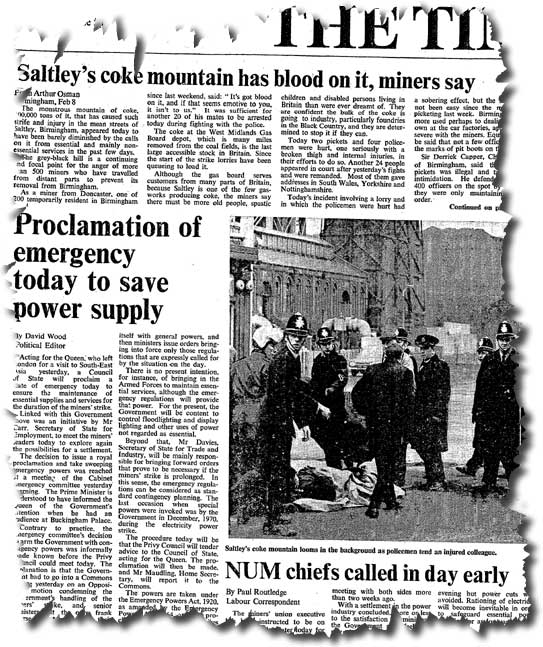 demands.
All 289 pits in England and Wales had been closed, with the miners
declaring they were prepared for a long fight.
demands.
All 289 pits in England and Wales had been closed, with the miners
declaring they were prepared for a long fight.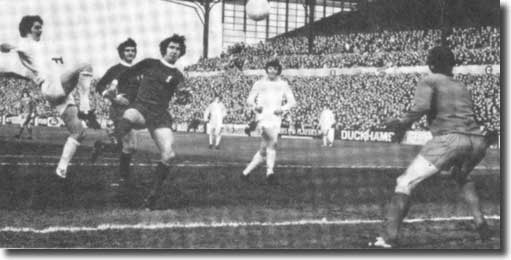 a superb twist and cunning pass began a move that quickly brought him
back into action 10 yards further upfield, where he flipped the ball overhead
to Clarke. Just as cleverly, equally nonchalantly, Clarke raised the ball
high over Clemence and into goal.' As the ball had dropped towards the
penalty spot, Clarke had found Smith, Lawler and Lloyd bearing down on
him menacingly and Clemence blocking his way to goal. He executed the
move with a masterly piece of finishing.
a superb twist and cunning pass began a move that quickly brought him
back into action 10 yards further upfield, where he flipped the ball overhead
to Clarke. Just as cleverly, equally nonchalantly, Clarke raised the ball
high over Clemence and into goal.' As the ball had dropped towards the
penalty spot, Clarke had found Smith, Lawler and Lloyd bearing down on
him menacingly and Clemence blocking his way to goal. He executed the
move with a masterly piece of finishing.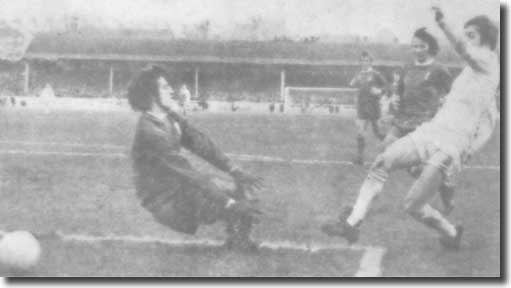 dominated affairs immediately after the
break, Leeds always had something in hand with their controlled, skilful
play, as reported by Eric Todd in The Guardian. 'For 18 minutes
in the second half, the Leeds goal was under threat. And for those 18
minutes, Leeds gave an exhibition of what defensive play is all about.
They were strong with it as well, passing to each other under Sprake's
nose, and daring Liverpool to take the ball off them. Sometimes they did,
and every time Leeds took it back, and started the whole business all
over again.'
dominated affairs immediately after the
break, Leeds always had something in hand with their controlled, skilful
play, as reported by Eric Todd in The Guardian. 'For 18 minutes
in the second half, the Leeds goal was under threat. And for those 18
minutes, Leeds gave an exhibition of what defensive play is all about.
They were strong with it as well, passing to each other under Sprake's
nose, and daring Liverpool to take the ball off them. Sometimes they did,
and every time Leeds took it back, and started the whole business all
over again.'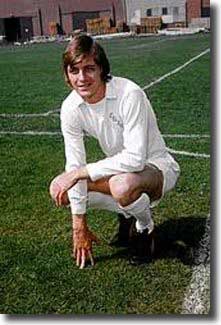 enough to preserve their hard earned advantage and ended
the game 2-0 victors.
enough to preserve their hard earned advantage and ended
the game 2-0 victors.